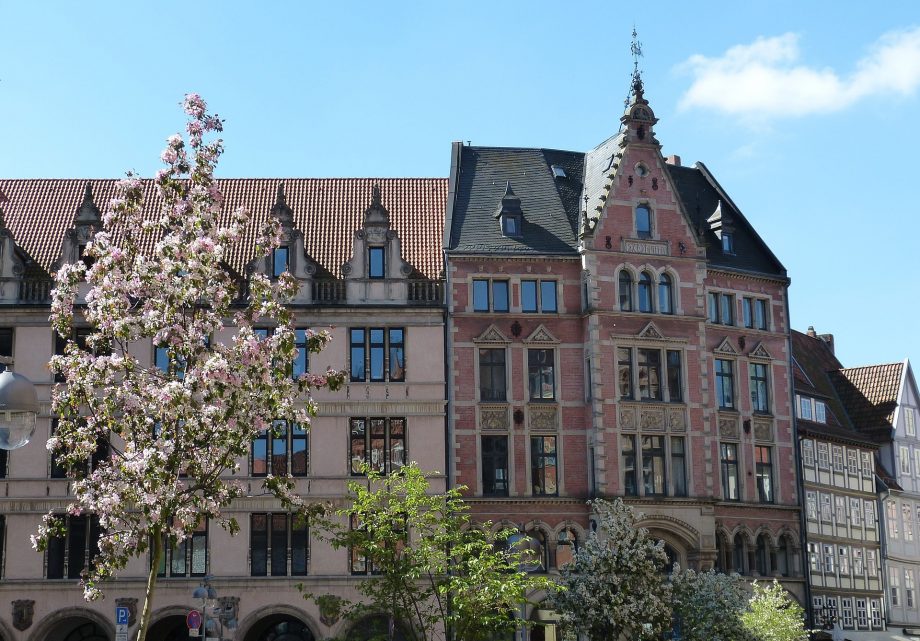Hanover (Hannover if we’re to use the increasingly Anglicised original Teutonic spelling) is one of the most famous and historic cities in Germany. The home of several major exhibitions and once the base of power within Germany, as well as providing one of the most impressive transport systems in all of Europe, Hanover is a must-visit for historians and futurists alike.
History of Hanover
The history of Hanover is rich and varied. At various points it has acted as a principality of the Holy Roman Empire, an independent kingdom and a province of Prussia.
Hanover initially belonged to the United Kingdom until Queen Victoria rose to power; laws of the land dictated that a woman could not rule over Hanover if she had a living male descendant. At this point ownership was transferred to the Holy Roman Empire, before French and Russian soldiers occupied the territory in 1803.
Hanover achieved independence in 1814, becoming a self-governing sovereign nation until 1866, when it became a province of the kingdom of Prussia following the Austro-Prussian war. During World War II, Hanover was heavily bombed by Allied forces and occupied by the British army. Once Germany regained independence in 1949, Hanover became part of the nation, though the former Kingdom of Hanover is now referred to as Lower Saxony.
Language and Climate in Hanover
Fittingly for such a regal and historical city, the traditional dialect of Hanover is regarded to be ‘purest’ incarnation of the German language. The local language is a variant of Lower Saxon (named for the Saxon tribe that inhabited the region, and a different language to that spoken in Saxony), as opposed to the standard German spoken elsewhere.
Don’t worry, however, all those lessons were not wasted. Citizens of Hanover learn standard German as a second language, and you should not have any issues communicating if this is a tongue you have some experience in. Transport announcements are also usually repeated in English too, though the rest of the city doesn’t tend to speak the language.
The summer months in Hanover tend to be bright and sunny, but it is one of the wettest and dampest cities in Germany. The winter, in particular, is pretty soggy, and humidity rarely drops below 70%.
Where to Stay in Hanover
The city of Hanover is divided into seventeen towns and four municipalities. The majority of the tourist attractions are located in an easily walkable, floor-marked area known as The Red Thread.
If you’re not travelling on business you are probably best served looking for accommodation in the city centre.
Getting Around Hanover
Despite being the second-oldest network in Germany, public transport in Hanover is ruthlessly efficient. Comprising of a series of buses, trains and trams, managed by the Greater Hanover Transport Network, these services run 24 hours a day, with most services starting in the north of the city.
Divided into three zones, a day ticket that can be used on any tram or train throughout the city is just €8.20 for an adult; even better, a group ticket for up to five travellers can be purchased for a mere €15.50. Tickets for young travellers below the age of 14 are even cheaper.
Taxis in Hanover are usually beige-coloured Mercedes’, but if you’d rather drive yourself, you’ll find the conditions very welcoming. Most roads are five lanes wide so you won’t find congestion a regular issue, but many citizens tend to utilise the fantastic public transport and use park-and-ride facilities. The roads also incorporate cycle lanes, with bicycles available for hire throughout the city.
Culture and Attractions in Hanover
It may not be as famous of glamorous as cities such as Berlin or Munich, but Hanover has no shortage of tourist attractions that make it worth a visit.
As per the Where to Stay segment, the Red Thread walking tour covers many of Hanover’s attractions. This is a DIY experience – simply look down and follow the red street markings to take in thirty-six different sights over the course of 4,200 metres. Opening at the Tourist Information Centre, where you can pick up an accompanying paper brochure (also available as a smartphone app), the tour takes in shopping districts, famous cultural sites, green spaces and historical locations. If all that walking sounds exhausting, plenty of guided tours by bus are also available.
One of the stops on the Red Thread tour is the Hanover Opera House. Destroyed by bombing during the Second World War, this cultural hub has been rebuilt and improved to the point where it is considered one of the finest such establishments in the world. Live performance is a regular occurrence in Hanover, as the city boasts over forty theatres and two symphony orchestras (plus The Scorpions, of Rock You Like a Hurricane fame, call the city home).
We’ve explained how Hanover has a very regal history, and as a result, there are a great many sites of historical interest. The Royal Gardens of Herrenhausen comprise of several formal gardens that once belonged to the Kings of Hanover, and occasionally host the International Firework Festival. The Town Hall is also a hugely impressive sight, and worth popping into, while the district of Old Town plays host to a great many churches in various states of repair.
Hanover hosts a number of museums, too. The Lower Saxony State Museum is the largest of them all, but don’t neglect the Sprengel (20th Century art), the Historic (go on, guess), the Kestner (showcasing over 4,000 pieces of art from a quartet of eras, largely ancient) and Wilhelm Busch (a celebration of caricature and satirical art). A jewel in the city’s crown, however, is the Hanover Zoo; over 3,000 animals from over 200 different species make up this huge attraction, which may well take more than one visit to fully take in.
If you’re hoping for something more relaxing, you can take in some upmarket shopping in Georgstraße, or browse the Old Town markets. Green spaces also abound, as do several spas open to the public (swimming costumes optional).
If you’re hoping to take in some live sport head to the HDI-Arena for a Hannover 96 game (currently plying their trade in the second division of the German football pyramid) or the Eisstadion am Pferdeturm to watch the Hannover Braves ice hockey team. Hanover is a huge rugby union town, so when DRC Hannover is playing expect empty streets. Basketball is also very popular, with the city represented by the successful Hannover Korbjäger.
Eating out in Hanover
Much like the language, Hanover’s traditional cuisine has Lower Saxon roots. Potatoes tend to accompany everything, with kale and asparagus typically the vegetables of choice.
If you’re a seafood aficionado there will be plenty of fish on offer, typically plaice, herring, flounder and mackerel, or if your tastes run more to red meat, you’ll enjoy Schlachteplatte and Rinderwurst, pre-cooked sausage famous in the Hanover area.
Elsewhere you’ll find plenty of Italian, Greek, Spanish and Asian options, as well as further traditional German dishes such as Currywurst.


